Reading Notes 10 the Bill of Rights

During the debates on the adoption of the Constitution, its opponents repeatedly charged that the Constitution as drafted would open the way to tyranny by the primal government. Fresh in their minds was the memory of the British violation of civil rights before and during the Revolution. They demanded a "bill of rights" that would spell out the immunities of private citizens. Several state conventions in their formal ratification of the Constitution asked for such amendments; others ratified the Constitution with the agreement that the amendments would be offered.
On September 25, 1789, the Kickoff Congress of the United states therefore proposed to the country legislatures 12 amendments to the Constitution that met arguments well-nigh frequently advanced against it. The start 2 proposed amendments, which concerned the number of constituents for each Representative and the bounty of Congressmen, were non ratified. Articles 3 to 12, however, ratified by three-fourths of the state legislatures, institute the first 10 amendments of the Constitution, known every bit the Nib of Rights. It was on December xv, 1791 that the state of Virginia voted for ratification, giving information technology the majority needed to get law.
The Bill of Rights Text
~~~~
The Preamble to The Neb of Rights
Congress of the The states begun and held at the Metropolis of New York, on Wednesday the fourth of March, one yard vii hundred and lxxx-ix.
THE Conventions of a number of the States, having at the fourth dimension of their adopting the Constitution, expressed a want, in social club to prevent misconstruction or corruption of its powers, that further declaratory and restrictive clauses should be added: And as extending the ground of public confidence in the Regime, will all-time ensure the beneficent ends of its institution.
RESOLVED past the Senate and House of Representatives of the United states of america, in Congress assembled, 2-thirds of both Houses concurring, that the following Articles be proposed to the Legislatures of the several States, as amendments to the Constitution of the United States, all, or any of which Articles, when ratified past three-fourths of the said Legislatures, to be valid to all intents and purposes, as part of the said Constitution; viz.
Articles in add-on to, and Amendment of the Constitution of the U.s., proposed by Congress, and ratified by the Legislatures of the several States, pursuant to the fifth Article of the original Constitution.
Note: The following text is a transcription of the first ten amendments to the Constitution in their original class. These amendments were ratified December 15, 1791, and class what is known as the "Bill of Rights."
Amendment I
Congress shall make no law respecting an establishment of religion, or prohibiting the free do thereof; or abridging the liberty of speech, or of the press; or the correct of the people peaceably to assemble, and to petition the Government for a redress of grievances.
Amendment Two
A well regulated Militia, being necessary to the security of a complimentary Country, the right of the people to keep and comport Arms, shall not be infringed.
Amendment 3
No Soldier shall, in fourth dimension of peace be quartered in whatever house, without the consent of the Owner, nor in time of war, but in a manner to be prescribed by law.
Amendment IV
The right of the people to be secure in their persons, houses, papers, and effects, against unreasonable searches and seizures, shall non be violated, and no Warrants shall upshot, but upon probable cause, supported by Adjuration or affidavit, and specially describing the identify to be searched, and the persons or things to be seized.
Amendment V
No person shall exist held to answer for a uppercase, or otherwise infamous crime, unless on a presentment or indictment of a Thou Jury, except in cases arising in the land or naval forces, or in the Militia, when in bodily service in fourth dimension of War or public danger; nor shall whatever person be field of study for the same offence to be twice put in jeopardy of life or limb; nor shall be compelled in any criminal example to be a witness confronting himself, nor be deprived of life, liberty, or belongings, without due process of law; nor shall private property be taken for public use, without just bounty.
Subpoena VI
In all criminal prosecutions, the accused shall savour the right to a speedy and public trial, by an impartial jury of the Land and district wherein the criminal offence shall accept been committed, which district shall accept been previously ascertained past law, and to exist informed of the nature and crusade of the accusation; to be confronted with the witnesses against him; to accept compulsory process for obtaining witnesses in his favor, and to have the Aid of Counsel for his defence force.
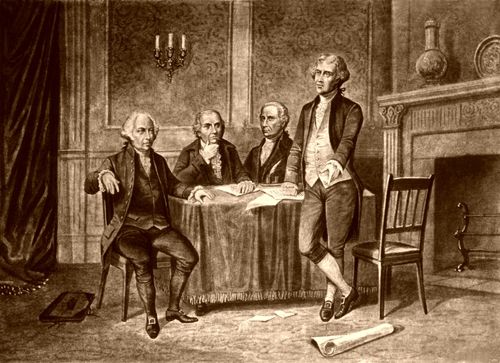
Leaders of the Continental Congress, John Adams, Gouverneur Morris, Alexander Hamilton, Thomas Jefferson. By Augustus Tholey, 1894
Amendment VII
In Suits at common law, where the value in controversy shall exceed twenty dollars, the right of trial by jury shall be preserved, and no fact tried past a jury, shall be otherwise re-examined in any Court of the U.s., than according to the rules of the mutual police force.
Amendment 8
Excessive bail shall not be required, nor excessive fines imposed, nor cruel and unusual punishments inflicted.
Amendment 9
The enumeration in the Constitution, of certain rights, shall not exist construed to deny or disparage others retained by the people.
Amendment X
The powers non delegated to the The states past the Constitution, nor prohibited by it to the States, are reserved to the States respectively, or to the people.
~~~~
Additional Amendments:
In addition to the original 10 amendments made to the U.S. Constitution known as the "Bill of Rights," over the years, 17 boosted amendments have been ratified by state legislatures.
They are as follows:
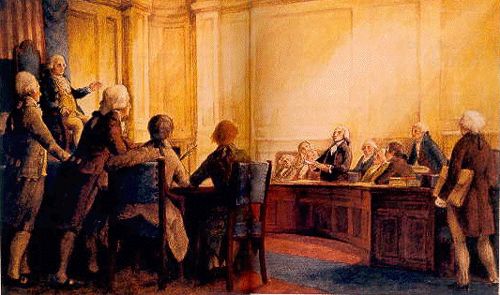
First Congress listens to Madison nowadays Bill of Rights
AMENDMENT XI
Passed by Congress March 4, 1794. Ratified February 7, 1795.
Note: Article III, section two, of the Constitution was modified by subpoena 11.
The Judicial power of the The states shall not exist construed to extend to any adjust in law or equity, commenced or prosecuted against one of the United states of america past Citizens of another State, or by Citizens or Subjects of whatever Foreign Country.
Amendment XII
Passed by Congress December 9, 1803. Ratified June xv, 1804.
Note: A portion of Commodity 2, section i of the Constitution was superseded by the 12th amendment.
The Electors shall see in their respective states and vote by ballot for President and Vice-President, one of whom, at least, shall not be an inhabitant of the same state with themselves; they shall name in their ballots the person voted for as President, and in distinct ballots the person voted for every bit Vice-President, and they shall make distinct lists of all persons voted for every bit President, and of all persons voted for as Vice-President, and of the number of votes for each, which lists they shall sign and certify, and transmit sealed to the seat of the government of the United States, directed to the President of the Senate; — the President of the Senate shall, in the presence of the Senate and House of Representatives, open up all the certificates and the votes shall then exist counted; — The person having the greatest number of votes for President, shall be the President, if such number be a bulk of the whole number of Electors appointed; and if no person have such majority, then from the persons having the highest numbers non exceeding three on the list of those voted for as President, the House of Representatives shall choose immediately, by election, the President. But in choosing the President, the votes shall be taken by states, the representation from each state having 1 vote; a quorum for this purpose shall consist of a fellow member or members from two-thirds of the states, and a majority of all the states shall be necessary to a pick. [And if the House of Representatives shall not choose a President whenever the correct of selection shall devolve upon them, before the quaternary day of March side by side following, then the Vice-President shall deed every bit President, equally in case of the expiry or other constitutional inability of the President. –]* The person having the greatest number of votes as Vice-President, shall be the Vice-President, if such number be a majority of the whole number of Electors appointed, and if no person accept a majority, then from the two highest numbers on the list, the Senate shall choose the Vice-President; a quorum for the purpose shall consist of two-thirds of the whole number of Senators, and a majority of the whole number shall be necessary to a pick. Just no person constitutionally ineligible to the office of President shall be eligible to that of Vice-President of the United States.
*Superseded past section 3 of the 20th subpoena.
Subpoena Xiii
Passed past Congress January 31, 1865. Ratified December 6, 1865.
Notation: A portion of Article Four, section 2, of the Constitution was superseded by the 13th amendment.
Department 1. Neither slavery nor involuntary servitude, except every bit a punishment for law-breaking whereof the party shall have been duly convicted, shall be within the United States, or any place subject to their jurisdiction.
Section 2. Congress shall have power to enforce this article past appropriate legislation.
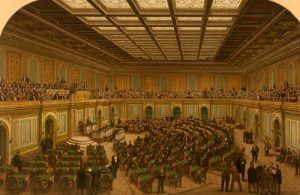
U.S. Congress, E. Sachse and Co, 1866
AMENDMENT Xiv
Passed by Congress June 13, 1866. Ratified July 9, 1868.
Note: Article I, section two, of the Constitution was modified by department ii of the 14th amendment.
Section 1. All persons born or naturalized in the United States, and subject area to the jurisdiction thereof, are citizens of the United States and of the State wherein they reside. No Country shall make or enforce any law which shall abridge the privileges or immunities of citizens of the United States; nor shall any State deprive whatsoever person of life, liberty, or property, without due procedure of law; nor deny to any person within its jurisdiction the equal protection of the laws.
Section 2. Representatives shall exist apportioned among the several States co-ordinate to their respective numbers, counting the whole number of persons in each State, excluding Indians not taxed. But when the right to vote at any election for the choice of electors for President and Vice-President of the United States, Representatives in Congress, the Executive and Judicial officers of a Land, or the members of the Legislature thereof, is denied to any of the male inhabitants of such State, being twenty-1 years of historic period,* and citizens of the U.s.a., or in whatever manner abridged, except for participation in rebellion, or other crime, the basis of representation therein shall be reduced in the proportion which the number of such male citizens shall acquit to the whole number of male citizens twenty-1 years of age in such State.
Section three. No person shall be a Senator or Representative in Congress, or elector of President and Vice-President, or hold any office, civil or military, under the United States, or under any Land, who, having previously taken an oath, as a member of Congress, or as an officer of the United states, or as a fellow member of any State legislature, or as an executive or judicial officeholder of any Land, to support the Constitution of the United states, shall accept engaged in insurrection or rebellion confronting the same, or given aid or condolement to the enemies thereof. Merely Congress may by a vote of 2-thirds of each Firm, remove such disability.
Section 4. The validity of the public debt of the United States, authorized by police, including debts incurred for payment of pensions and bounties for services in suppressing coup or rebellion, shall not be questioned. But neither the Usa nor whatsoever State shall assume or pay whatsoever debt or obligation incurred in aid of insurrection or rebellion against the United States, or any claim for the loss or emancipation of any slave; just all such debts, obligations and claims shall be held illegal and void.
Section 5. The Congress shall take the power to enforce, by appropriate legislation, the provisions of this article.
*Changed by section ane of the 26th amendment.
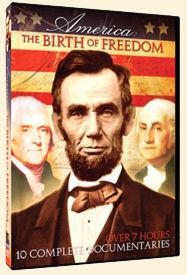
Nativity of Liberty DVD, available at our General Store
Subpoena XV
Passed by Congress February 26, 1869. Ratified Feb iii, 1870.
Section 1. The right of citizens of the The states to vote shall non be denied or abridged by the United States or by any State on account of race, color, or previous condition of servitude–
Department ii. The Congress shall have the power to enforce this article by appropriate legislation.
AMENDMENT Xvi
Passed past Congress July ii, 1909. Ratified February 3, 1913.
Note: Article I, section 9, of the Constitution was modified by amendment 16.
The Congress shall have power to lay and collect taxes on incomes, from whatever source derived, without circulation among the several States, and without regard to any census or enumeration.
AMENDMENT XVII
Passed by Congress May 13, 1912. Ratified April 8, 1913.
Note: Article I, section three, of the Constitution was modified past the 17th amendment.
The Senate of the United states shall be composed of two Senators from each Land, elected by the people thereof, for half dozen years; and each Senator shall take one vote. The electors in each Country shall have the qualifications requisite for electors of the about numerous branch of the State legislatures.
When vacancies happen in the representation of any Country in the Senate, the executive authority of such State shall outcome writs of ballot to fill such vacancies: Provided, That the legislature of any State may empower the executive thereof to make temporary appointments until the people fill the vacancies past election as the legislature may directly.
This subpoena shall not be so construed as to affect the election or term of whatsoever Senator chosen earlier it becomes valid every bit office of the Constitution.
AMENDMENT XVIII
Passed by Congress December 18, 1917. Ratified January 16, 1919. Repealed by amendment 21.
Section ane. Afterwards one twelvemonth from the ratification of this article the industry, sale, or transportation of intoxicating liquors inside, the importation thereof into, or the exportation thereof from the United States and all territory subject to the jurisdiction thereof for drinkable purposes is hereby prohibited.
Section 2. The Congress and the several States shall have concurrent power to enforce this article by appropriate legislation.
Section iii. This article shall be inoperative unless information technology shall have been ratified every bit an amendment to the Constitution past the legislatures of the several States, every bit provided in the Constitution, inside seven years from the engagement of the submission hereof to the States by the Congress.
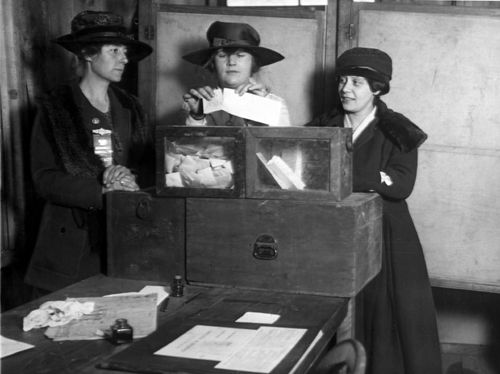
Women vote, 1917
Subpoena 19
Passed by Congress June four, 1919. Ratified Baronial xviii, 1920.
The right of citizens of the United States to vote shall not be denied or abridged by the Usa or by whatever State on account of sexual activity.
Congress shall have power to enforce this commodity past appropriate legislation.
AMENDMENT XX
Passed by Congress March 2, 1932. Ratified January 23, 1933.
Notation: Article I, section 4, of the Constitution was modified by section 2 of this subpoena. In addition, a portion of the 12th amendment was superseded by department 3.
Section 1. The terms of the President and the Vice President shall terminate at noon on the 20th mean solar day of January, and the terms of Senators and Representatives at apex on the 3d twenty-four hour period of January, of the years in which such terms would have ended if this article had not been ratified; and the terms of their successors shall and then brainstorm.
Section 2. The Congress shall get together at least once in every year, and such coming together shall begin at noon on the 3d solar day of January, unless they shall by police force appoint a different day.
Section three. If, at the time stock-still for the kickoff of the term of the President, the President elect shall take died, the Vice President elect shall become President. If a President shall non have been chosen before the time fixed for the beginning of his term, or if the President elect shall have failed to qualify, then the Vice President elect shall act as President until a President shall take qualified; and the Congress may by law provide for the case wherein neither a President elect nor a Vice President shall have qualified, declaring who shall then act as President, or the manner in which 1 who is to act shall exist selected, and such person shall act appropriately until a President or Vice President shall have qualified.
Section 4. The Congress may by law provide for the example of the death of whatever of the persons from whom the Business firm of Representatives may choose a President whenever the right of selection shall have devolved upon them, and for the case of the death of any of the persons from whom the Senate may cull a Vice President whenever the right of choice shall have devolved upon them.
Department 5. Sections ane and 2 shall take outcome on the 15th twenty-four hour period of October following the ratification of this article.
Section 6. This article shall exist inoperative unless it shall take been ratified equally an amendment to the Constitution past the legislatures of three-fourths of the several States within seven years from the appointment of its submission.
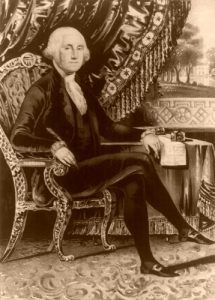
George Washington
AMENDMENT XXI
Passed by Congress Feb 20, 1933. Ratified December 5, 1933.
Department 1. The eighteenth article of subpoena to the Constitution of the U.s.a. is hereby repealed.
Department 2. The transportation or importation into any Country, Territory, or Possession of the United States for commitment or apply therein of intoxicating liquors, in violation of the laws thereof, is hereby prohibited.
Section 3. This article shall be inoperative unless information technology shall accept been ratified equally an amendment to the Constitution by conventions in the several States, every bit provided in the Constitution, within seven years from the date of the submission hereof to united states of america by the Congress.
AMENDMENT XXII
Passed by Congress March 21, 1947. Ratified February 27, 1951.
Section 1. No person shall be elected to the part of the President more than twice, and no person who has held the office of President, or acted equally President, for more than two years of a term to which some other person was elected President shall be elected to the function of President more than once. Simply this Article shall not apply to whatever person holding the role of President when this Article was proposed by Congress, and shall non foreclose whatsoever person who may be holding the function of President, or acting equally President, during the term within which this Article becomes operative from belongings the function of President or interim as President during the remainder of such term.
Section two. This article shall be inoperative unless it shall have been ratified as an amendment to the Constitution by the legislatures of 3-fourths of the several States within seven years from the engagement of its submission to the states by the Congress.
Amendment XXIII
Passed by Congress June sixteen, 1960. Ratified March 29, 1961.
Section ane. The Commune constituting the seat of Authorities of the United States shall appoint in such fashion as Congress may direct: A number of electors of President and Vice President equal to the whole number of Senators and Representatives in Congress to which the Commune would be entitled if it were a State, merely in no effect more than the to the lowest degree populous State; they shall be in add-on to those appointed by the States, but they shall be considered, for the purposes of the election of President and Vice President, to be electors appointed by a State; and they shall see in the District and perform such duties as provided by the twelfth article of subpoena.
Department 2. The Congress shall take power to enforce this commodity by appropriate legislation.

Coloring History past Legends of America. Available at Legends' General Store.
Amendment XXIV
Passed past Congress August 27, 1962. Ratified January 23, 1964.
Section one. The correct of citizens of the United States to vote in whatever principal or other election for President or Vice President, for electors for President or Vice President, or for Senator or Representative in Congress, shall not be denied or abridged by the United States or whatever State by reason of failure to pay poll revenue enhancement or other revenue enhancement.
Section 2. The Congress shall accept power to enforce this article by appropriate legislation.
AMENDMENT XXV
Passed past Congress July half-dozen, 1965. Ratified February x, 1967.
Note: Article Two, section i, of the Constitution was affected by the 25th subpoena.
Section ane. In case of the removal of the President from office or of his death or resignation, the Vice President shall become President.
Section 2. Whenever there is a vacancy in the office of the Vice President, the President shall nominate a Vice President who shall have office upon confirmation by a bulk vote of both Houses of Congress.
Department 3. Whenever the President transmits to the President pro tempore of the Senate and the Speaker of the House of Representatives his written annunciation that he is unable to discharge the powers and duties of his function, and until he transmits to them a written declaration to the reverse, such powers and duties shall be discharged by the Vice President as Acting President.
Section four. Whenever the Vice President and a majority of either the principal officers of the executive departments or of such other body as Congress may by law provide, transmit to the President pro tempore of the Senate and the Speaker of the House of Representatives their written declaration that the President is unable to discharge the powers and duties of his role, the Vice President shall immediately presume the powers and duties of the office as Interim President.
Thereafter, when the President transmits to the President pro tempore of the Senate and the Speaker of the Firm of Representatives his written announcement that no disability exists, he shall resume the powers and duties of his function unless the Vice President and a majority of either the chief officers of the executive section or of such other body as Congress may past law provide, transmit inside 4 days to the President pro tempore of the Senate and the Speaker of the Business firm of Representatives their written proclamation that the President is unable to discharge the powers and duties of his role. Thereupon Congress shall determine the outcome, assembling within forty-eight hours for that purpose if not in session. If the Congress, within twenty-ane days later on receipt of the latter written declaration, or, if Congress is not in session, within 20-ane days after Congress is required to assemble, determines by two-thirds vote of both Houses that the President is unable to discharge the powers and duties of his function, the Vice President shall keep to discharge the same as Acting President; otherwise, the President shall resume the powers and duties of his part.
Subpoena XXVI
Passed by Congress March 23, 1971. Ratified July 1, 1971.
Note: Amendment xiv, section 2, of the Constitution was modified past section 1 of the 26th amendment.
Section 1. The right of citizens of the United States, who are eighteen years of age or older, to vote shall not be denied or abridged by the United states or by whatsoever State on account of age.
Department ii. The Congress shall have ability to enforce this article by appropriate legislation.
AMENDMENT XXVII
Originally proposed Sept. 25, 1789. Ratified May vii, 1992.
No law, varying the compensation for the services of the Senators and Representatives, shall have consequence, until an election of representatives shall have intervened.
~~~~
Compiled and edited by Dave Alexander, updated February 2020.
Primary source U.Southward. National Archives and Records Administration
Also See:
Virtually the U.s.a. Constitution'
American History
Documenting American History
Full Text of the Constitution
Source: https://www.legendsofamerica.com/ah-billrights/
Belum ada Komentar untuk "Reading Notes 10 the Bill of Rights"
Posting Komentar